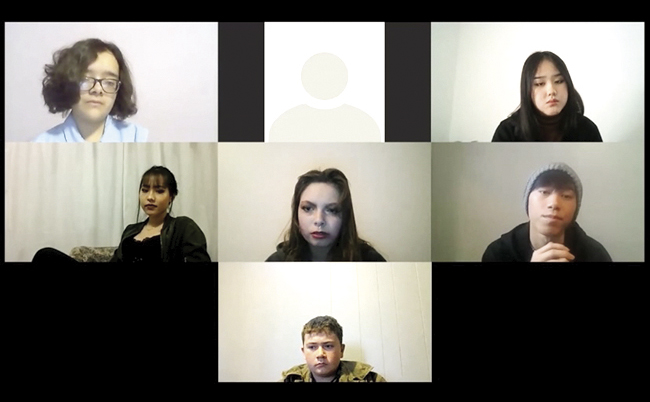
There was nothing normal about this One-Act season, but that didn’t stop Tracy Area High School thespians from enjoying one of its best outcomes.
Tracy Area High School finished fifth out of eight teams at this year’s sub-section One-Act Tournament — just one point away from qualifying for sections.
“We were very, very close to making it to sections this year which is exciting. One of the judges said we brought them to tears, so I’m really looking forward to what we can do next year because of how far we’ve come,” said director Doria Drost. “It was definitely a lot different. We didn’t have as much opportunity for blocking and interacting with different cast members on stage like we would normally have, but on the plus side, because the students didn’t have to focus on that as much, or sets and costume design, it really gave them the opportunity to dig deeper into their characters.”
Each school’s play was pre-recorded, and the Minnesota State High School League left it up to each school district and directors to whether or not the students could rehearse and perform in person. Drost said that decision did not come lightly, but she thought it would be best for everyone to do everything virtually. The school’s fall play was done on stage and with masks, but some pandemic-related issues back then persuaded Drost to play it safe for One-Act.
“Based off of what happened in our fall play, I made the decision as director to do it all virtual for both rehearsals and performances, so we did everything via Zoom,” Drost said. “It definitely wasn’t like in normal years. I felt it would be most beneficial, that way they wouldn’t have to worry about missing out on rehearsal or missing out on the performance due to possible exposures.”
This year’s production was “The Empty Chair,” a hard-hitting drama that focuses on teen substance abuse. The story centers on a recovery meeting, with one empty chair, signifying the death of a teen from an overdose. The play revolves around how each character comes to terms with that death.
“It’s set up like a substance abuse intervention meeting for teenagers, and it goes through their experiences with various substances and alcoholism,” said Drost. “It explores their personal journeys with that, as well as their interactions with an empty role.”
The six participants — Sarita Canto, Chandra Moua, Angie Yang, Sophia Dieter, Michael Vue and Connor Towne — all read their parts from their homes in front of a white background. Drost said working in such a way gave the students more freedom to make their own decisions on their characters, with some guidance from Drost.
“They did really, really well,” Drost said. “With the technical side of things, we got to test a lot of that out in rehearsals, making sure that students could use screen sharing and use the Zoom reactions; timing was the most critical piece with it. We were all at separate locations and had to figure out if there was a lag with the Internet, how much of a lag it would be.”
The students began rehearsing in early December after auditions right after Thanksgiving break. Rehearsals ended the first week of January.
“I’m proud of everything that the students did,” Drost said. “They were really great about everything. I think they enjoyed it, because compared to a traditional production, this was definitely a lot more flexible. It was really up to them for a lot of things — memorizing their lines and everything else — because they didn’t get to see me in person like they normally would. It definitely put some more responsibility on them, and I think that made them grow as actors.”
